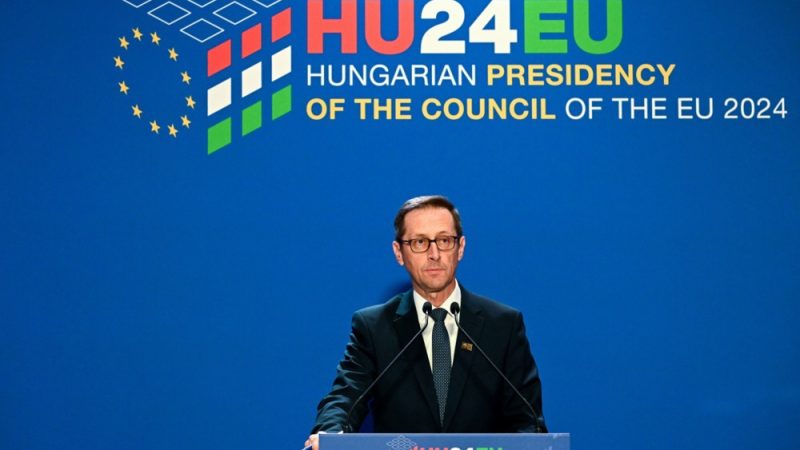The Hungarian Presidency of the Council of the EU is trying to reconcile member states’ hesitance with the eagerness for telecom sector consolidation as highlighted in the Letta and Draghi reports, according to draft Council conclusions dated Wednesday (18 September) and seen by Euractiv.
The Council of the EU, presided by Hungary until 31 December, tabled its initial document on the Commission’s February white paper, “How to master Europe’s digital infrastructure needs?” on 21 August. The compromise document seen by Euractiv is the first new draft, that integrates the views of member states. It will be discussed in a telecom Council working party on 24 September.
“The Council underlines that market-driven consolidation […] could foster investment in [telecoms] in the EU and thus open further opportunities for growth and innovation,” reads the document, in a bid to align the document with Letta and Draghi’s reports sounding alarm on telecom competition policy.
The two former Italian prime ministers argued for market consolidation to create big EU players in their respective reports. EU telecom operators claim that the EU’s regulatory framework prevents them from growing to a size that would make them competitive on the global stage.
But member states remain hesitant for major regulatory changes, pending a thorough impact assessment from the European Commission.
The Council remains cautious with the terms used when describing consolidation. The Council, “considers that […] the question of optimal scale and fragmentation,” is not only a question of the size of EU telecom operators, but that other solutions should be examined, including “industry cooperation.”
But “industry cooperation” remains undefined. It could mean anything from collaborating with other industries, like cloud providers, to creating synergies, to telecoms developing interoperability solutions or developing programs jointly to catch up on innovation.
Hungarians strengthened a paragraph stressing the “significance of legal certainty,” including the correct enforcement of EU’s cornerstone telecom law, the European Electronic Communications Code and the newest telecom law, which aims to fasten roll-out of fibre and 5G throughout the EU, the Gigabit Infrastructure Act.
The draft document also changed regarding subsea cables, spectrum management, copper switch-off, environmental sustainability, funding instruments, and consumer welfare.
Subsea cables, security
The Hungarians deleted an earlier call on the Commission to consider a legislative proposal on the security and resilience of submarine cable infrastructure. They toned down wording asking the Commission to consider “further measures to promote” security of these critical infrastructures.
The Hungarian Presidency made clear that spectrum management is within the remit of public policy of member states, this time driving away from the Letta and Draghi reports which claimed that there was a need for more coordination in spectrum.
Hungary included a reference to the need for “more robust mitigation efforts” on possible interference from third countries, like Russia, Belarus, Türkiye, on spectrum management.
Environmental considerations
In addition, considerations on environmental sustainability made it to the draft. Instead of just mentioning the lower environmental impact on fibre roll-out, Hungary strengthened the wording, including that the “Council acknowledges that the digital sector currently consumes significant amounts of energy and produces e-waste.”
The draft suggests that replacing existing infrastructure with fibre, and should not remain the only tool for decarbonising the digital sector.
They included a call upon the Commission to introduce “a target on green digitalisation” in the review of EU’s 2030 digital decade targets, expected for 30 June 2026.
Paradoxically, although fibre networks are more efficient than copper networks, the wording was softened on the “copper switch-off,” a long-term project to update old network infrastructure.
The Hungarians instead revised the earlier statement, which said “copper switch-off could be a key measure to release full fibre rollout,” to instead say “copper switch-off could be gradually realised to support” fibre rollout.
Investment and consumer welfare
The draft also toned down the wording on the need for public investments in telecoms to adapt to technological change.
It included references to the upcoming negotiations for the EU budget, expected to start some time next year, saying that their recommendation on public investments should not pre-determine negotiations.
Finally, the Hungarians reinforced a reference on consumer welfare, writing that the Council would stress on the Commission the need to implement EU telecom measures on universal service, to ensure consumers with low incomes have access to special tariffs.

